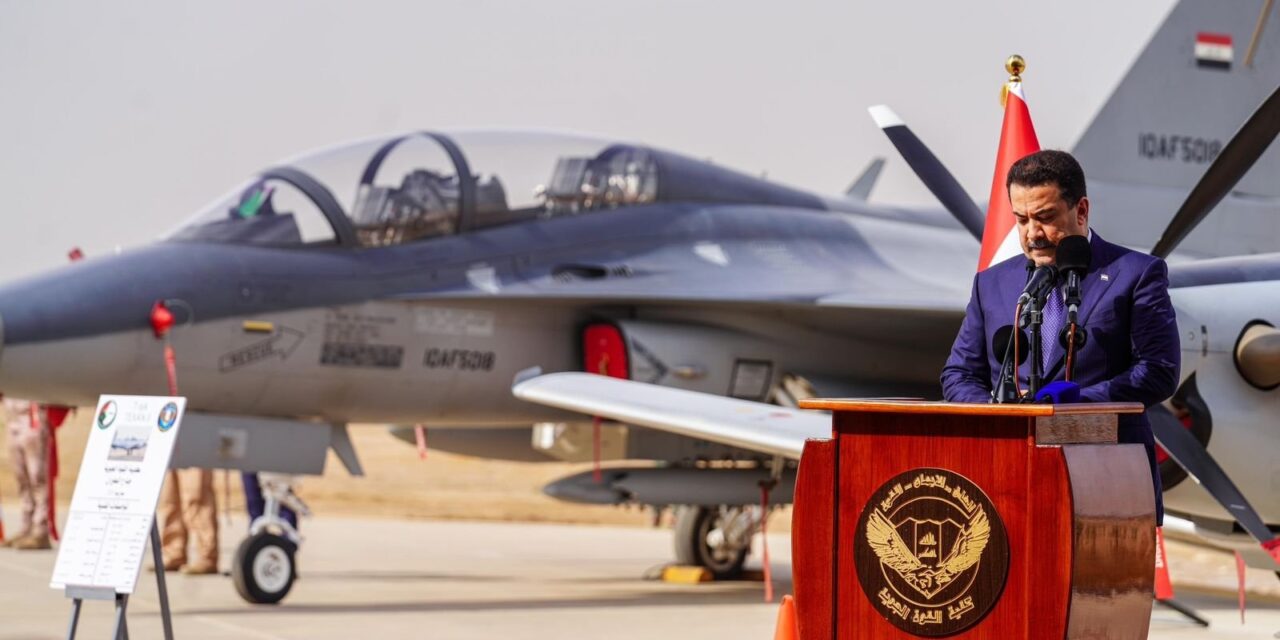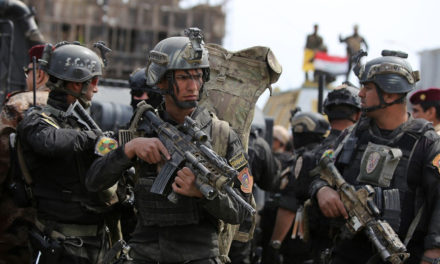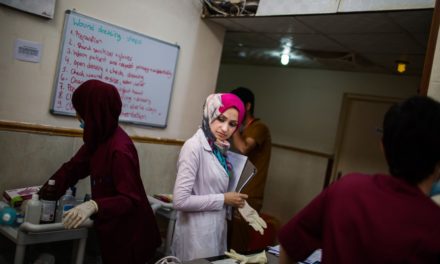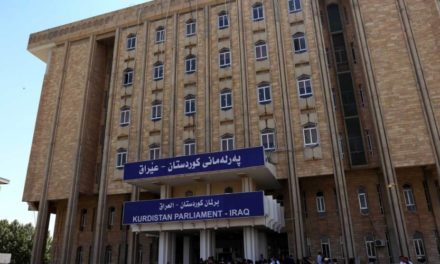(Photo: INA)
Last month, news emerged that Iraq signed a deal worth $2.8 billion to buy advanced air defense missile systems from South Korea. This otherwise significant defense news went rather unnoticed amid the worsening violence and threat of all-out war in the Middle East. Notwithstanding the limited publicity, this peculiar purchase carries significant security risks for Iraq and the wider region at a time of great sensitivity. It should be scrutinized and possibly discouraged.
The reason Baghdad’s planned purchase of the M-SAM II or Cheongung II air defense system should raise eyebrows is because it appears acutely misaligned with Iraq’s national defense needs and policies. The first question that comes to mind is: what kind of threat is this system supposed to defend against, given it will cost three times the annual budget of Iraq’s agriculture ministry?
Certainly, ISIS remnants do not have fighter jets or ballistic missile capabilities requiring this kind of defense. Over the last two decades, the vast majority of aerial threats violating Iraq’s airspace have been Turkish and Iranian attacks on groups or individuals inside Iraq deemed by Ankara or Tehran to represent threats to their own national security. The Kurdistan Workers’ Party (PKK) and its affiliates in Iraq have been the focus of Turkish strikes using manned and unmanned aircraft. In Iran’s case, the list of targets has mainly included Iranian Kurdish opposition groups, followed by high profile Iraqi energy and business tycoons accused of dealings with Israel, and, rarely, bases hosting U.S. military personnel.
The aerial attacks by Iran or Turkey are embarrassing for Baghdad, occasionally inflict casualties and destruction on local communities, and undermine stability in contested districts like Sinjar. They are, however, a problem that primarily afflicts the territories of Iraqi Kurdistan, where Baghdad is not free to deploy military forces in the first place. Meanwhile, areas under the control of the federal government are only rarely targeted. And given the groups primarily targeted in those incursions (the PKK, which Iraq banned earlier this year, and Iranian opposition groups that Iraq has disarmed and displaced at Iran’s behest) they are not perceived to constitute threats to core Iraqi interests.
Moreover, in the case of Iran, its allies in Iraq have not only worked to justify some of the attacks on Iraqi Kurdistan, but also conducted attacks of their own against its cities, airports, and energy infrastructure.
As alluded to above, Iraq has been seeking political means to mitigate Iranian and Turkish violations. Iraq sympathizes with Ankara and Tehran’s efforts to crack down on groups that attack them from Iraqi territory and has made border security and counter-terrorism deals with both countries to ensure these efforts are done in coordination and cooperation with Iraq to avoid further unilateral attacks.
It is also clear the purchase of these expensive air defense batteries is not meant to prevent Iranian missile attacks on bases hosting U.S. forces like Ain al-Asad. First, because Baghdad could ask the U.S. to deploy more of its own battle-tested air defense systems on the Pentagon’s dime. Second, the paramilitaries that are part of the Coordination Framework are themselves involved in numerous attacks on U.S. forces (some 170 in the first five months after October 2023) and are certainly not interested in spending billions to protect them. And third, last month, Baghdad and Washington unveiled their plan for the withdrawal of U.S. personnel under which U.S. forces will be largely out of Iraq in a year.
There has been, of course, one additional source of aerial threats to certain actors in Iraq that is lately becoming more salient. Since 2019, Israel has struck targets inside Iraq where advanced Iranian weapons, including ballistic missiles capable of reaching Israel, transferred to Iran-backed Iraqi paramilitaries may have been stored. This is the threat that more likely prompted Baghdad to seek modern air defense missile systems. Indeed, it was soon after the Iranian ballistic missile shipments were exposed in 2018 that Baghdad first approached Moscow to purchase S-400 air defense systems – a deal that did not progress due to risk of U.S. sanctions.
Further analysis of Baghdad’s procurement decision-making rationale is warranted, but given the nature of the government that exists in Baghdad today, with its main stakeholders (Asaib Ahl al-Haq, the Badr Organization, and State of Law) being close allies of Iran, logic suggests that among the different sources of threats, Israel is the one the Korean system is meant to defend against.
A quick evaluation of the current conditions points to a number of risks that could arise from the air defense deal, which was made at a critical junction in regional security dynamics.
The brutal war in Palestine and Lebanon has greatly weakened Iran’s allies closest to Israel’s border, Hamas and Hezbollah. Unless Iran’s leaders plan to drop from the fight against Israel and abandon nearly five decades of the Islamic Revolution project, Tehran will surely seek to rebuild its instruments of power projection and deterrence. Iraq and Yemen, which are harder to reach for Israel, are the most likely theaters of this rebuilding of capabilities. With that in mind, Iran will likely try to move more weapons and capabilities into Iraq to compensate for setbacks in Lebanon and Gaza.
Iraqi paramilitaries are already involved in the fight against Israel. This involvement has peaked since the explosive pager attack on Hezbollah with drone and missile attacks happening on a near daily basis, bringing their total number since October 2023 to more than 400. These attacks, and the rebuilding of capabilities, when it begins, will likely invite fresh Israeli airstrikes against Iran’s allies in Iraq. As a result, Iraqi civilians will be killed and the country’s vital infrastructure will be destroyed.
Now that Israeli Prime Minister Benjamin Netanyahu has declared Iraq part of the “curse,” the paramilitaries fully recognize the risk of Israeli retribution, and yet they say it will not deter them from further intensifying their operations. Acquiring advanced air defense systems that, whether by design or not, can defend the storage sites or transit routes of Iranian weapons in Iraq will only embolden the paramilitaries to take greater risks under a false sense of impunity.
Moreover, the domination of Iraq’s political institutions by paramilitaries and their infiltration of the country’s security institutions raises the possibility that this purchase is being made at Iran’s behest, or will later be exploited by Tehran, to build a form of forward air defense against Israel, adding a layer of air defense for Iran against Israeli attack at Iraq’s expense.
Even if Baghdad sincerely plans to use the system for its own national defense, the purchase remains misguided. The missiles will in all likelihood be ineffective at protecting the country’s numerous vital infrastructure components that could be the target of Israel’s lethal air force, including airports, oil fields, power plants, telecommunications, pipelines, refineries, and oil export terminals.
Prime Minister Mohammed Al-Sudani says his government’s goal is to contain a perilous situation and keep the war from spreading further, including to Iraq. Buying weapons from the wish list of Iran’s proxies is a move in the wrong direction. Iraq’s best defense is a capable and respected government that carries out its duties to prevent foreign sponsored paramilitaries from hijacking the nation’s war and peace decisions. Spending billions on air defense is at best a great waste of resources that could address real problems like water scarcity and youth unemployment. At worst, it’s a purchase meant to provide cover for further buildup of Iranian capabilities in Iraq and a new layer of forward air defense for Iran on Iraq’s dime.

Omar Al-Nidawi
Omar Al-Nidawi is a Middle East analyst focusing on Iraqi political, security, and energy affairs and the Programs Director at Enabling Peace in Iraq Center (EPIC). The opinions expressed in this piece are his own.










